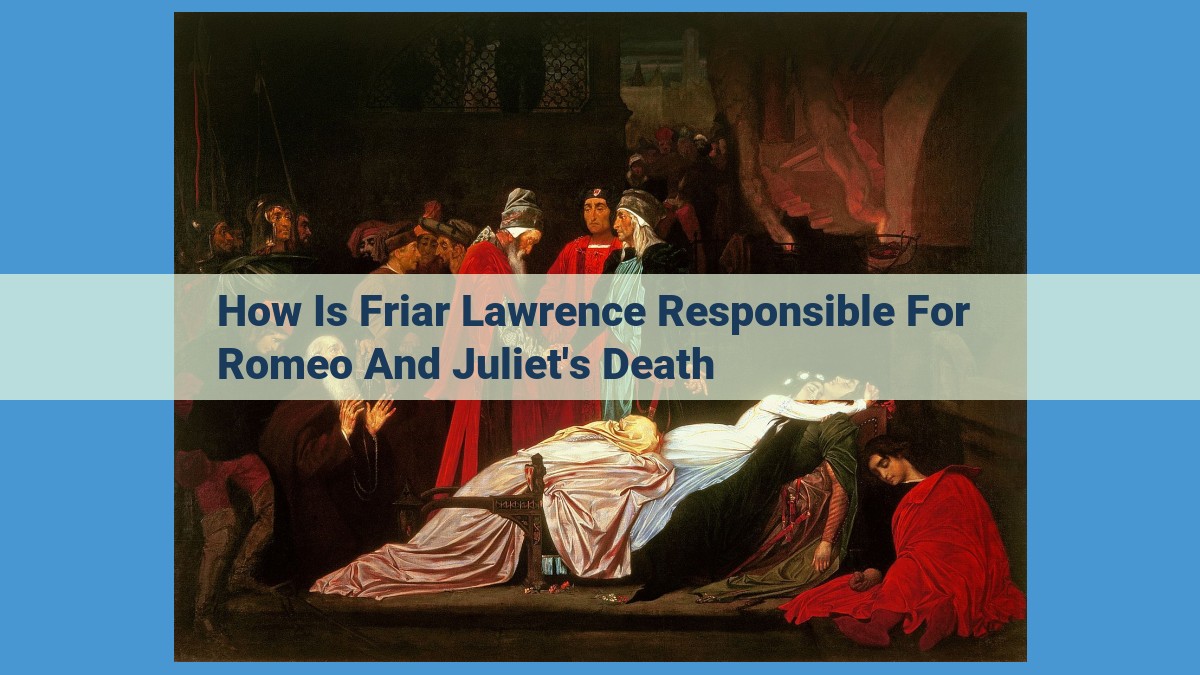Friar Lawrence’s responsibility for Romeo and Juliet’s demise stems from his impulsive actions that facilitated their secret marriage, his failure to properly inform Romeo of Juliet’s plan, his overconfidence in his scheme, and his short-sightedness in overlooking potential complications. These lapses in judgment, coupled with Romeo and Juliet’s reckless decision-making and the weight of secrecy, led to a tragic sequence of events that culminated in their untimely deaths.
Impulsive Marriage: The Hasty Union of Romeo and Juliet
In the timeless tragedy of Romeo and Juliet, the titular lovers’ impulsive marriage sets the stage for a whirlwind of events that ultimately lead to their demise. The hasty union, orchestrated by Friar Lawrence, is a testament to the perils of reckless decision-making and the lack of proper planning.
Friar Lawrence’s swift actions, fueled by a desire to help the young lovers, are marked by a lack of foresight. He fails to fully consider the potential consequences of marrying Romeo and Juliet in secret, underestimating the Montagues’ and Capulets’ long-standing feud.
Romeo and Juliet’s own reckless decision-making further compounds the situation. Their impulsive nature leads them to disregard the potential risks and consequences of their actions. Driven by their intense passion, they fail to anticipate the dangers that lie ahead.
The hasty marriage sets in motion a chain of events that ultimately leads to the tragic deaths of Romeo and Juliet. The secrecy surrounding their union creates misunderstandings and trust issues, while Friar Lawrence’s overconfidence in his own plan leads to unforeseen complications. The play serves as a cautionary tale about the importance of foresight and preparation, as well as the devastating consequences of impulsive actions.
Miscommunication and Trust: The Toll of Secrets in Romeo and Juliet
In Shakespeare’s timeless tragedy, “Romeo and Juliet,” the lovers’ ill-fated destiny is intricately intertwined with a web of secrecy and misunderstanding. One of the most pivotal moments in the play occurs when Friar Lawrence fails to fully inform Romeo of Juliet’s plan to feign death. This single act of miscommunication sets in motion a chain of events that ultimately leads to the tragic demise of these star-crossed lovers.
Secrecy, by its very nature, creates barriers to trust. Juliet’s plan, however well-intentioned, is based on a deception that ultimately undermines the bond between her and Romeo. Romeo’s lack of knowledge about the truth leads him to make reckless decisions, such as believing Juliet to be dead and taking his own life.
This miscommunication is compounded by Friar Lawrence’s own short-sightedness. In his eagerness to help the lovers, he overlooks the potential consequences of his incomplete disclosure. Had he fully informed Romeo of Juliet’s plan, the tragedy could have been averted.
The_ impact of secrecy and misunderstanding is evident throughout the play_. Romeo and Juliet’s inability to communicate openly leads to a series of misunderstandings that culminate in their untimely deaths. The play serves as a poignant reminder of the importance of open and honest communication in any relationship.
Ultimately, the toll of secrets in Romeo and Juliet is a lesson in the dangers of miscommunication and the fragility of trust. It is a cautionary tale about the importance of transparency, trust, and the need to fully understand the consequences of our actions before committing to them.
Overconfidence and Blind Faith: A Dangerous Path
The tragic tale of Romeo and Juliet serves as a cautionary reminder of the perils of overconfidence and blind faith. Friar Lawrence, in his naive optimism, orchestrates a plan to unite the star-crossed lovers, underestimating the potential consequences of his actions. Similarly, Romeo, blinded by his love for Juliet, underestimates the obstacles that lie in their path, believing that their love will triumph over all.
Friar Lawrence’s overconfidence manifests in his belief that his plan is foolproof. He fails to consider the potential for miscommunication, misunderstandings, and unforeseen circumstances. His naive assumption that everything will proceed smoothly ultimately leads to the tragic outcome. Romeo, too, is blinded by his blind faith in the power of love. He believes that their love will conquer all obstacles, underestimating the societal pressures, familial conflicts, and external forces that could tear them apart.
The story of Romeo and Juliet highlights the risks and dangers of underestimating potential obstacles. When we are overconfident or have blind faith, we tend to overlook factors that could jeopardize our plans. This can lead to disastrous consequences, as seen in the play. The lesson to be learned is that it is crucial to be realistic, consider all potential risks, and prepare accordingly. By anticipating and preparing for the worst, we can mitigate the impact of unforeseen circumstances and increase our chances of success.
Foresight and Consequences: The Importance of Preparation
In Shakespeare’s timeless tragedy “Romeo and Juliet,” the lovers’ tragic fate stems from a lack of foresight and preparation. Friar Lawrence, the well-meaning but short-sighted priest, orchestrates a risky plan to unite the star-crossed pair, overlooking possible complications.
Friar Lawrence’s Miscalculations
Friar Lawrence’s plan hinged on Romeo receiving a message informing him of Juliet’s feigned death and her subsequent awakening at his tomb. However, unforeseen circumstances, such as Friar John’s detention, prevented the letter from reaching Romeo.
Unforeseen Circumstances and Tragic Outcomes
The ripple effects of this miscommunication proved devastating. Romeo, believing Juliet to be truly dead, succumbed to despair and consumed poison. Juliet, awakening to find her beloved lifeless, took her own life.
Lessons from Failure
The tragedy of Romeo and Juliet serves as a poignant reminder of the importance of preparation and foresight. Failure to anticipate and plan for potential obstacles can lead to catastrophic consequences.
It is crucial to thoroughly consider all possible outcomes before embarking on any venture. By identifying and addressing potential risks, we can mitigate the likelihood of unforeseen events and maximize our chances of success.
